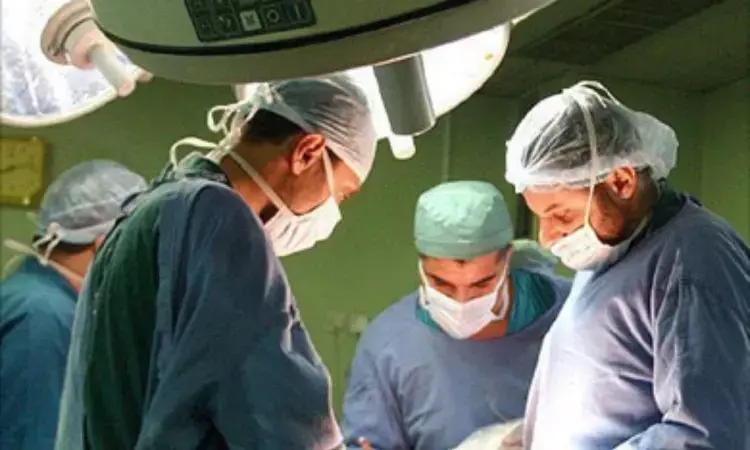- Home
- Medical news & Guidelines
- Anesthesiology
- Cardiology and CTVS
- Critical Care
- Dentistry
- Dermatology
- Diabetes and Endocrinology
- ENT
- Gastroenterology
- Medicine
- Nephrology
- Neurology
- Obstretics-Gynaecology
- Oncology
- Ophthalmology
- Orthopaedics
- Pediatrics-Neonatology
- Psychiatry
- Pulmonology
- Radiology
- Surgery
- Urology
- Laboratory Medicine
- Diet
- Nursing
- Paramedical
- Physiotherapy
- Health news
- Fact Check
- Bone Health Fact Check
- Brain Health Fact Check
- Cancer Related Fact Check
- Child Care Fact Check
- Dental and oral health fact check
- Diabetes and metabolic health fact check
- Diet and Nutrition Fact Check
- Eye and ENT Care Fact Check
- Fitness fact check
- Gut health fact check
- Heart health fact check
- Kidney health fact check
- Medical education fact check
- Men's health fact check
- Respiratory fact check
- Skin and hair care fact check
- Vaccine and Immunization fact check
- Women's health fact check
- AYUSH
- State News
- Andaman and Nicobar Islands
- Andhra Pradesh
- Arunachal Pradesh
- Assam
- Bihar
- Chandigarh
- Chattisgarh
- Dadra and Nagar Haveli
- Daman and Diu
- Delhi
- Goa
- Gujarat
- Haryana
- Himachal Pradesh
- Jammu & Kashmir
- Jharkhand
- Karnataka
- Kerala
- Ladakh
- Lakshadweep
- Madhya Pradesh
- Maharashtra
- Manipur
- Meghalaya
- Mizoram
- Nagaland
- Odisha
- Puducherry
- Punjab
- Rajasthan
- Sikkim
- Tamil Nadu
- Telangana
- Tripura
- Uttar Pradesh
- Uttrakhand
- West Bengal
- Medical Education
- Industry
Is performing hypospadias surgery in early childhood a wise decision? Study sheds light

Germany: Findings from a recent survey revealed satisfaction of 90% of the patients with early hypospadias surgery with average health-related quality of life (HRQOL) and low level of decisional regret in patients and parents.
The findings of the Decision Regret And Quality of Life Assessment (DRAQULA) study, published in the Journal of Pediatric Urology, support the current practice of operating hypospadias in early childhood.
Hypospadias is a common congenital malformation. Mild forms may be corrected by some cosmetic procedures, but correcting moderate and severe forms is important to avoid functional limitations and may have a lifelong impact on quality of life. Currently, a debate is ongoing on whether the current practice of correcting hypospadias during childhood should be continued or waited until the child reaches the age of consent and makes the decision himself.
Ahmed T. Hadidi, Hypospadias Center, Pediatric Surgery Department, Sana Klinikum, Offenbach, Germany, and colleagues evaluate patient satisfaction, DRAQULA among adolescents (older than 15 years) and adults after hypospadias surgery in childhood.
For this purpose, the researchers contacted 234 patients operated on hypospadias as children in the centre and their parents after they reached the age of 15 years to complete a questionnaire survey to evaluate their regret with the operative decision, satisfaction with the operative result, and the health-related quality of life.
The survey was based on the Decision Regret Scale available in the literature; a score of 100 implied maximum dissatisfaction or regret, and on the Kidscreen10 index. Satisfaction was measured on a scale from 1 to 5 with 5 signifying satisfaction.
Following were the key findings from the survey:
- 34.6 % of patients from 15 to 43 years (mean age 19.7 years) completed the survey. 44 Patients had distal, and 17 proximal hypospadias and the remaining 20 patients could not remember the type of hypospadias they had.
- The patient's satisfaction with the operative result was 5 (full satisfaction) in 74.1 %, 4 in 18.5 %, 3 in 6.2 % and 2 in 1.2 % (mean satisfaction score 4.7 of 5).
- Regarding decision regret among patients, 7.0 % of patients had no decision regret. Only 14.8 % reported mild and 6.2 % moderate decisional regret (mean decisional regret score 4.8).
- 30.0 % of parents answered the parents’ questionnaire. 81.7 % had no decision regret.
- 18.3 % of parents had decision regret; 14.1 % of parents reported mild, 2.8 % of parents were moderate, and 1.4 % of parents reported strong decisional regret.
- The mean HRQOL T-score was 55.9 (SD 10, control Group of adolescent males from 12 to 18 years.) and thus corresponded to the average of the reference normal population.
"Our data and the current literature show high satisfaction with hypospadias surgery, an average quality of life, and low decisional regret after hypospadias surgery in early childhood," the researchers concluded.
Reference:
Wirmer, J., Fawzy, M., Sennert, M., & Hadidi, A. T. (2023). Should we correct hypospadias during childhood? Decision Regret And QUality of Life Assessment (DRAQULA) study. Journal of Pediatric Urology. https://doi.org/10.1016/j.jpurol.2023.12.005
Dr Kamal Kant Kohli-MBBS, DTCD- a chest specialist with more than 30 years of practice and a flair for writing clinical articles, Dr Kamal Kant Kohli joined Medical Dialogues as a Chief Editor of Medical News. Besides writing articles, as an editor, he proofreads and verifies all the medical content published on Medical Dialogues including those coming from journals, studies,medical conferences,guidelines etc. Email: drkohli@medicaldialogues.in. Contact no. 011-43720751


